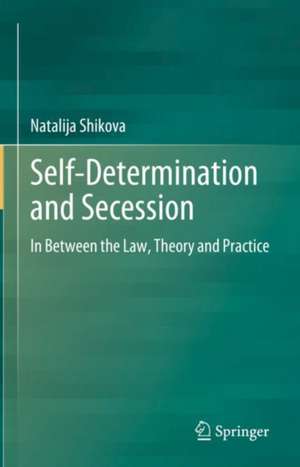Self-Determination and Secession: In Between the Law, Theory and Practice
Autor Natalija Shikovaen Limba Engleză Hardback – 28 iul 2023
Preț: 1004.67 lei
Preț vechi: 1225.20 lei
-18% Nou
Puncte Express: 1507
Preț estimativ în valută:
192.25€ • 198.33$ • 160.43£
192.25€ • 198.33$ • 160.43£
Carte tipărită la comandă
Livrare economică 26 martie-09 aprilie
Preluare comenzi: 021 569.72.76
Specificații
ISBN-13: 9783031343216
ISBN-10: 3031343212
Pagini: 277
Ilustrații: IX, 277 p.
Dimensiuni: 155 x 235 mm
Greutate: 0.58 kg
Ediția:1st ed. 2023
Editura: Springer International Publishing
Colecția Springer
Locul publicării:Cham, Switzerland
ISBN-10: 3031343212
Pagini: 277
Ilustrații: IX, 277 p.
Dimensiuni: 155 x 235 mm
Greutate: 0.58 kg
Ediția:1st ed. 2023
Editura: Springer International Publishing
Colecția Springer
Locul publicării:Cham, Switzerland
Cuprins
Introduction.- PART I SELF-DETERMINATION OF PEOPLES.- Phases and developments of the concept of the self- determination of the peoples.- The right holders of self-determination.- Practicing the right to self-determination.-Ways and modalities for realization of the self – determination.- PART II SECESSION.- The phenomenon of secession.- The dynamics of secession.- The legitimacy of the secession claims.- The emergence of a secessionist entity.- PART THREE: INTERNAL SELF-DETERMINATION.- The internal aspect of the right to self-determination.- The social base for realization of internal self-determination.- Tools and forms for the realization of internal self-determination.- Systems of power sharing.- Part IV CONCLUSIONS.- Self – determination revisited.
Notă biografică
Dr. Natalija Shikova is an associate professor in the Faculty of Law at the International Balkan University in Skopje, the Republic of North Macedonia. Her expertise is in the sphere of international public law, and she teaches related courses at the faculty and the university level. Occasionally, she is a guest lecturer at the other universities in the country and abroad. As for her academic training, she has a bachelor’s degree and passed the bar exam in law, as well as a PhD in international law from the University St. Cyril and Methodius in Skopje, the Republic of North Macedonia. From 2011 to 2012, she was a Fulbright research scholar at George Washington University Law School in Washington DC, USA.
Textul de pe ultima copertă
This book offers a comprehensive summary of extant international law scholarship on the topics of self-determination and secession and positions the concepts among present-day theory and relevant practice, illustrated through various ongoing cases and historical examples. The right to self-determination is among the least understood rights within international law. Theoretical dilemmas – as to whether there is a link between self-determination and secession – are nothing new. In essence, self-determination is a much broader concept than secession and obtaining independent statehood. Unilateral secession is not prohibited by international law, but neither is it per se welcomed or accepted in practice. Beyond the context of decolonization, secession claims have long been viewed with disapproval in international law, and lawyers have been extremely skeptical about the issue. Although this is still the case, there are also new trends and opportunities to explore situations in which secession can be accepted, legitimized, or even legally permissible. The yardstick for this is the diplomatic response to secessionism and the growing involvement of the international community in mediation and conflict resolution. Though finding solutions can be difficult, within the existing frame, the ongoing tension between the duty of every society to recognize pluralism and diversity on the one hand, and the inherent desire of every culture – whether majority, minority or indigenous – to protect its values and ensure conformity on the other, must be resolved. The practices and modalities that envisage the internal dimension of the right to self-determination as a right that is exercised within the state borders can offer such opportunities. The appropriate role of the state and the international community is to serve as mediators between competing forces and to set parameters that can transform destructive conflicts into productive political models.
Caracteristici
Opens a new possibility for the interpretation and understanding of the right to self-determination Provides a comprehensive summary of extant international law scholarship on self-determination and secession Includes a wealth of case studies to illustrate the practical implementation of the right to self-determination
